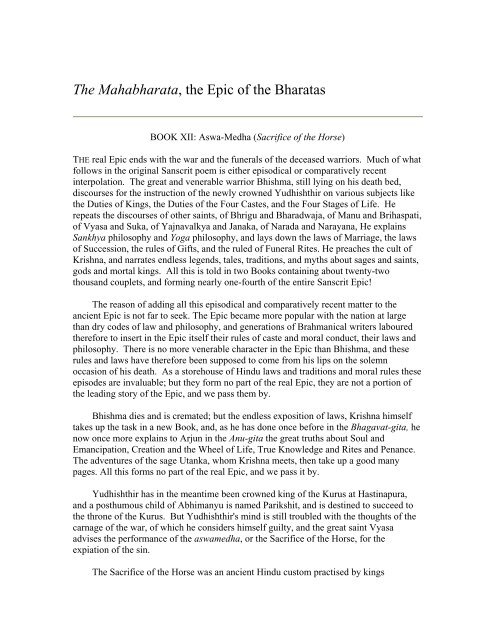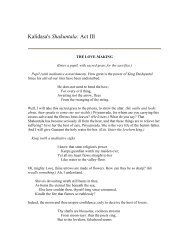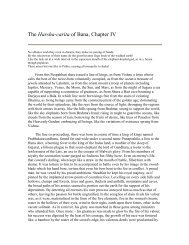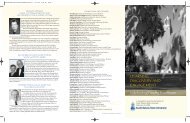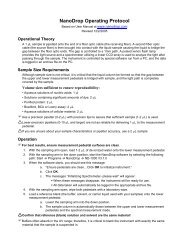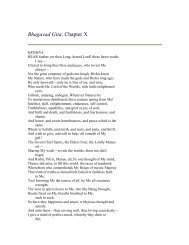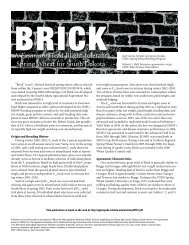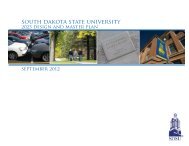Aswa-Medha
Aswa-Medha
Aswa-Medha
Create successful ePaper yourself
Turn your PDF publications into a flip-book with our unique Google optimized e-Paper software.
The Mahabharata, the Epic of the Bharatas<br />
BOOK XII: <strong>Aswa</strong>-<strong>Medha</strong> (Sacrifice of the Horse)<br />
THE real Epic ends with the war and the funerals of the deceased warriors. Much of what<br />
follows in the original Sanscrit poem is either episodical or comparatively recent<br />
interpolation. The great and venerable warrior Bhishma, still lying on his death bed,<br />
discourses for the instruction of the newly crowned Yudhishthir on various subjects like<br />
the Duties of Kings, the Duties of the Four Castes, and the Four Stages of Life. He<br />
repeats the discourses of other saints, of Bhrigu and Bharadwaja, of Manu and Brihaspati,<br />
of Vyasa and Suka, of Yajnavalkya and Janaka, of Narada and Narayana, He explains<br />
Sankhya philosophy and Yoga philosophy, and lays down the laws of Marriage, the laws<br />
of Succession, the rules of Gifts, and the ruled of Funeral Rites. He preaches the cult of<br />
Krishna, and narrates endless legends, tales, traditions, and myths about sages and saints,<br />
gods and mortal kings. All this is told in two Books containing about twenty-two<br />
thousand couplets, and forming nearly one-fourth of the entire Sanscrit Epic!<br />
The reason of adding all this episodical and comparatively recent matter to the<br />
ancient Epic is not far to seek. The Epic became more popular with the nation at large<br />
than dry codes of law and philosophy, and generations of Brahmanical writers laboured<br />
therefore to insert in the Epic itself their rules of caste and moral conduct, their laws and<br />
philosophy. There is no more venerable character in the Epic than Bhishma, and these<br />
rules and laws have therefore been supposed to come from his lips on the solemn<br />
occasion of his death. As a storehouse of Hindu laws and traditions and moral rules these<br />
episodes are invaluable; but they form no part of the real Epic, they are not a portion of<br />
the leading story of the Epic, and we pass them by.<br />
Bhishma dies and is cremated; but the endless exposition of laws, Krishna himself<br />
takes up the task in a new Book, and, as he has done once before in the Bhagavat-gita, he<br />
now once more explains to Arjun in the Anu-gita the great truths about Soul and<br />
Emancipation, Creation and the Wheel of Life, True Knowledge and Rites and Penance.<br />
The adventures of the sage Utanka, whom Krishna meets, then take up a good many<br />
pages. All this forms no part of the real Epic, and we pass it by.<br />
Yudhishthir has in the meantime been crowned king of the Kurus at Hastinapura,<br />
and a posthumous child of Abhimanyu is named Parikshit, and is destined to succeed to<br />
the throne of the Kurus. But Yudhishthir's mind is still troubled with the thoughts of the<br />
carnage of the war, of which he considers himself guilty, and the great saint Vyasa<br />
advises the performance of the aswamedha, or the Sacrifice of the Horse, for the<br />
expiation of the sin.<br />
The Sacrifice of the Horse was an ancient Hindu custom practised by kings
exercising suzerain powers over surrounding kings. A horse was let free, and was<br />
allowed to wander from place to place, accompanied by the king's guard. If any<br />
neighbouring king ventured to detain the animal, it was a signal for war. If no king<br />
ventured to restrain the wanderer, it was considered a tacit mark of submission to the<br />
owner of the animal. And when the horse returned from its peregrinations, it was<br />
sacrificed with great pomp and splendour at a feast to which all neighbouring kings were<br />
invited.<br />
Yudhishthir allowed the sacrificial horse to wander at will, and Arjun accompanied<br />
it. Wherever the horse was stopped, Arjun fought and conquered, and thus proclaimed<br />
the supremacy of Yudhishthir over all neighbouring potentates. After various wars and<br />
adventures in various regions, Arjun at last returned victorious with the steed to<br />
Hastinapura, and the sacrifice commenced.<br />
The description of the sacrifice is somewhat artificial, and concerns itself with rites<br />
and ceremonious details and gifts to Brahmans, and altogether bears unmistakable<br />
evidence of the interpolating hand of later priestly writers. Nevertheless we cannot<br />
exclude from this translation of the leading incidents of the Epic the last great and<br />
crowning act of Yudhishthir, now anointed monarch of Kuruland.<br />
The portion translated in this Book forms Sections lxxxv. and parts of Sections<br />
lxxxviii. and lxxxix. of Book xiv. of the original text.<br />
I THE GATHERING<br />
Victor of a hundred battles, Arjun bent his homeward way,<br />
Following still the sacred charger free to wander as it may,<br />
Strolling minstrels to Yudhishthir spake of the returning steed,<br />
Spake of Arjun weeding homeward with the victor's crown of meed,<br />
And they sang of Arjun's triumphs in Gandhara's distant vale,<br />
On the banks of Brahmaputra and in Sindhu's rocky dale.<br />
Twelfth day came of Magha's bright moon and auspicious was the star,<br />
Nigher came the victor Arjun from his conquests near and far,<br />
Good Yudhishthir called his brothers, faithful twins and Bhima true,<br />
Spake to them in gentle accents, and his words were grave and few:<br />
"Bhima! Now returneth Arjun with the steed from many a fray,<br />
So they tell me, noble brother, who have met him on the way,
And the time of aswa-medha day by day is drawing nigh,<br />
Magha's full moon is approaching, and the winter passeth by,<br />
Let the Brahmans versed in Vedas choose the sacrificial site,<br />
For the feast of many nations, for the aswa-medha rite."<br />
Bhima heard of Arjun's coming,--hero with the curly hair,--<br />
And to do Yudhishthir's mandate did with gladsome heart repair,<br />
Brahmans versed in sacrifices, cunning architects of fame,<br />
Builders of each various altar with the son of Pritha came,<br />
And upon a level greensward measured forth the sacred site,<br />
Laid it out with halls and pathways for the sacrificial rite.<br />
Mansions graced with gem and jewel round the bright arena shone,<br />
Palaces of golden lustre glinted in the morning sun,<br />
Gilt and blazoned with devices lofty columns stood around,<br />
Graceful arches gold-surmounted spanned the consecrated ground,<br />
Gay pavilions rose in beauty round the sacrificial site,<br />
For the queens of crowned monarchs wending to the holy rite,<br />
Humbler dwellings rose for Brahmans, priests of learning and of fame,<br />
Come to view Yudhishthir's yajna and to bless Yudhishthir's name.<br />
Messengers with kindly greetings went to monarchs far-renowned,<br />
Asked them to Hastina's city, to the consecrated ground,<br />
And to please the great Yudhishthir came each king and chieftain bold,<br />
With their slaves and dark-eye damsels, arms and horses, gems and gold,<br />
Came and found a royal welcome in pavilions rich and high,<br />
And the sealike voice of nations smote the echoing vault of shy!<br />
With his greetings did Yudhishthir, for each chief and king of men,<br />
Cooling drinks and sumptuous viands, beds of regal pride ordain,<br />
Stables filled with corn and barley and with milk and luscious cane<br />
Greeted tall and warlike tuckers and the steeds with flowing mane.<br />
Munis from their hermitages to the sacred yajna came,<br />
Rishis from the grove and forest lisping BRAHMA'S holy name,<br />
Famed Acharyas versed in Vedas to the city held their way,
Brahmacharins with grass-girdle, chanting sweet the saman lay,<br />
Welcomed Kuru's pious monarch, saint and sage and man of grace,<br />
And with gentle condescension showed each priest his fitting place.<br />
Skilled mechanics, cunning artists, raised the structures for the rite,<br />
And with every needful object graced the sacrificial site,<br />
Every duty thus completed, joyful Yudhishthir's mind,<br />
And he blessed his faithful brothers with an elder's blessings kind.<br />
II THE FEASTING<br />
Men in nations are assembled, hymns are sung by saint and sage,<br />
And in learnéd disputations keen disputants oft engage,<br />
And the concourse of the monarchs view the splendour of the rite,<br />
Like the glorious sky of INDRA is the sacrificial site!<br />
Bright festoons and flaming streamers are on golden arches hunk,<br />
Groups of men and gay-dressed women form a bright and joyous throng,<br />
Jars of cool and sparkling waters, vessels rich with gold inlaid,<br />
Costly cups and golden vases are in order due arrayed.<br />
Sacrificial stakes of timber with their golden fastenings graced,<br />
Consecrated by the mantra are in sumptuous order placed,<br />
Countless creatures of the wide earth, fishes from the lake and flood,<br />
Buffaloes and bulls from pasture, beasts of prey from jungle wood,<br />
Birds and every egg-born creature, insects that from moisture spring,<br />
Denizens of cave and mountain for the sacrifice they bring.<br />
Noble chiefs and mighty monarchs gaze in wonder on the site,<br />
Filled with every living object, corn and cattle for the rite,<br />
Curd and cake and sweet confection are for feasting Brahmans spread,<br />
And a hundred thousand people are with sumptuous viands fed!<br />
With the accents of the rain-cloud drum and trumpet raise their voice,<br />
Speak Yudhishthir's noble bounty, bid the sons of men rejoice,<br />
Day by day the holy yajna grows in splendour and in joy,<br />
Rice in hillocks feeds all comers, maid and matron, man and boy,
Lakes of curd and lakes of butter speak Yudhishthir's bounteous feast,<br />
Nations of the Jambu-dwipa share it, greatest and the least!<br />
For a hundred diverse races from a hundred regions came,<br />
Ate of good Yudhishthir's bounty, sang of good Yudhishthir's fame,<br />
And a thousand proud attendants, gay with earrings, garland-graced,<br />
Carried food unto the feeders and the sweet confections placed,<br />
Viands fit for crownéd monarchs were unto the Brahmans given,<br />
Drinks of rich and cooling fragrance like the nectar-drink of heaven!<br />
III SACRIFICE OF ANIMALS<br />
Victor of a hundred battles, Arjun came with conquering steed,<br />
Vyasa herald of the Vedas bade the holy rite proceed:<br />
"For the day is come, Yudhishthir, let the sacrifice be done,<br />
Let the priests repeat the mantra golden as the morning sun!<br />
Threefold bounteous be thy presents and a threefold merit gain,<br />
For thy wealth of gold is ample, be thy gifts like summer's rain,<br />
May the threefold rich performance purify the darkening stain,<br />
Blood of warriors and of kinsmen slaughtered on the gory plain,<br />
May the yajna's pure ablution wash thee of the cruel sin,<br />
And the weed of sacrificers may the good Yudhishthir win!"<br />
Vyasa spake; and good Yudhishthir took the diksha of the rite,<br />
And commenced the aswa-medha gladdening every living wight,<br />
Round the altar's holy lustre moved the priests with sacred awe,<br />
Swerved not from the rule of duty, failed not in the sacred law.<br />
Done the rite of pure pravargya with the pious hymn and lay,<br />
To the task of abhishava priests and Brahmans led the way,<br />
And the holy Soma-drinkers pressed the sacred Soma plant,<br />
And performed the pure scavana with the solemn saman chant.<br />
Bounty waits on squalid hunger, gifts dispel the suppliant's fear,<br />
Gold revives the poor and lowly, mercy wipes the mourner's tear,<br />
Tender care relieves the stricken by the gracious Ding's command,<br />
Charity with loving sweetness spreads her smile o'er all the land!
Day by day the aswa-medha doth with sacred rites proceed,<br />
Day by day on royal bounty poor and grateful myriads feed,<br />
And adept in six Vedangas, strict in vow and rich in lore,<br />
Sage preceptors, holy teachers, grew in virtue ever more!<br />
Six good stakes of vilwa timber, six of hard khadira wood,<br />
Six of seasoned sarvavarnin, on the place of yajna stood,<br />
Two were made of devadaru, pine that on Himalay grows,<br />
One was made of wood of slesha, which the sacrificer knows,<br />
Other stakes of golden lustre quaint with curious carving done,<br />
Draped in silk and gold-brocaded like the constellations shone!<br />
And the consecrated altar built and raised of bricks of gold,<br />
Shone in splendour like the altar Daksha built in days of old,<br />
Eighteen cubits square the structure, four deep layers of brick in height,<br />
With a spacious winged triangle like an eagle in its flight!<br />
Beasts whose flesh is pure and wholesome, dwellers of the lake or sky,<br />
Priests assigned each varied offering to each heavenly power on high,<br />
Bulls of various breed and colour, steeds of mettle true and tried,<br />
Other creatures, full three hundred, to the many stakes were tied.<br />
Deva-rishis viewed the feasting, sweet Gandharvas woke the song,<br />
Apsaras like gleams of sunlight on the greensward tripped along,<br />
Kinnaras and Kim-purushas mingled in the holy rite,<br />
Siddhas of austerest penance stood around the sacred site,<br />
Vyasa's great and gifted pupils who the holy hymns compiled,<br />
Helped the royal aswa-medha, on the royal yajna smiled!<br />
From the bright ethereal mansions heavenly minstrel Narad came,<br />
Chitra-sena woke the music, singer of celestial fame,<br />
Cheered by more than mortal music priests their holy task begun,<br />
And Yudhishthir's fame and virtue with a brighter lustre shone!<br />
IV<br />
SACRIFICE OF THE HORSE<br />
Birds and beasts were immolated for the sacrificial food,<br />
Then before the sacred charger priests in rank and order stood,
And by rules of Veda guided slew the horse of noble breed,<br />
Placed Draupadi, Queen of yajna, by the slain and lifeless steed,<br />
Hymns and gifts and deep devotion sanctified the noble Queen,<br />
Woman's true and stainless virtue, woman's worth tend wisdom keen!<br />
Priests adept in sacred duty cooked the steed with pious rite,<br />
And the steam of welcome fragrance sanctified the sacred site,<br />
Good Yudhishthir and his brothers, by the rules by rishis spoke,<br />
Piously inhaled the fragrance and the sin-destroying smoke!<br />
Severed limbs and sacred fragments of the courser duly dressed,<br />
Priests upon the blazing altar as a pious offering placed,<br />
Vyasa herald of the Vedas raised his voice in holy song,<br />
Blessed Hastina's righteous monarch and the many-nationed throng!<br />
V GIFTS<br />
Unto Brahmans gave Yudhishthir countless nishkas of bright gold,<br />
Unto sage and saintly Vyasa all his realm and wealth untold,<br />
But the bard and ancient rishi who the holy Vedas spake,<br />
Rendered back the monarch's present, earthly gift he might not take!<br />
"Thins is Kuru's ancient empire, rule the nations of the earth,<br />
Gods have destined thee as monarch from the moment of thy birth,<br />
Gold and wealth and costly present let the priests and Brahmans hoard,<br />
Be it thins to rule thy subjects as their father and their lord!<br />
Krishna too in gentle accents to the doubting monarch said:<br />
"Vyasa speaketh word of wisdom and his mandate be obeyed!"<br />
From the rishi good Yudhishthir then received the Kuru-land,<br />
With a threefold gift of riches gladdened all the priestly band,<br />
Pious priests and grateful nations to their distant regions went,<br />
And his share of presents Vyasa to the ancient Pritha sent.<br />
Fame and virtue Kuru's monarch by the aswa-medha wins,<br />
And the rite of pure ablution cleanses all Yudhishthir's sins,
And he stands amid his brothers, brightly beaming, pure and high,<br />
Even as INDRA stands encircled by the dwellers of the sky,<br />
And the concourse of the monarchs grace Yudhishthir's regal might,<br />
As the stars and radiant planets grace the stillness of the night!<br />
Gems and jewels in his bounty, gold and garments rich and rare,<br />
Gave Yudhishthir to each monarch, slaves and damsels passing fair,<br />
Loving gifts to dear relations gave the king of righteous fame,<br />
And the grateful parting monarchs blessed Yudhishthir's hallowed name.<br />
Last of all with many tear-drops Krishna mounts his lofty car,<br />
Faithful still in joy or sorrow, faithful still in peace or war,<br />
Arjun's comrade, Bhima's helper, good Yudhishthir's friend of yore,<br />
Krishna leaves Hastina's mansions for the sea-girt Dwarka's shore!<br />
From: The Ramayana and the Mahabharata. Condensed into English verse by Romesh<br />
C. Dutt. New York: Dutton, 1910, 312-320.


